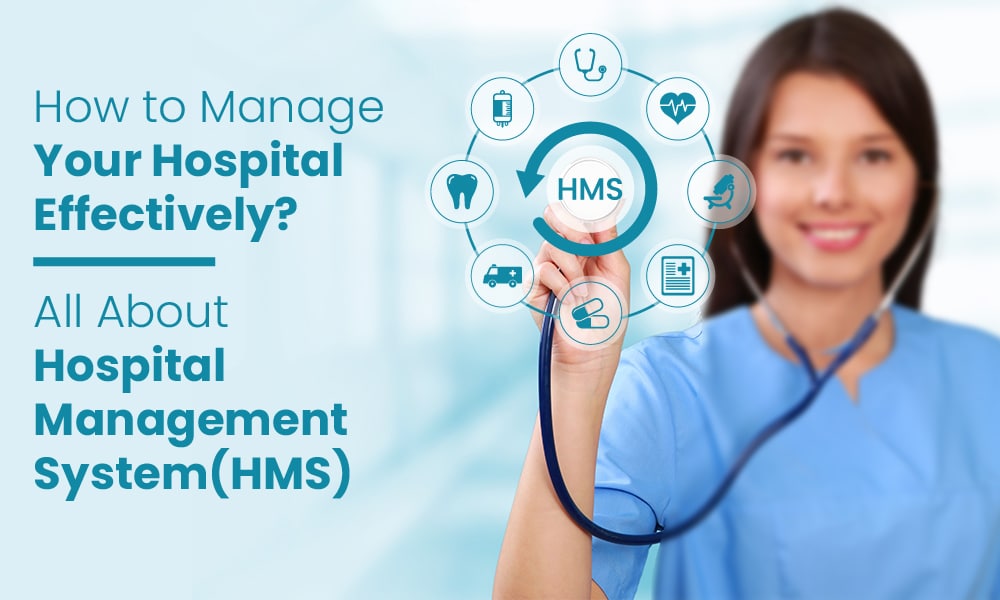
In today’s fast-paced world, efficient management of healthcare institutions is crucial for providing top-notch patient care. The hospital management system has emerged as a revolutionary solution to streamline various administrative tasks and enhance overall hospital efficiency. In this blog, we’ll explore the basic concepts of hospital management software and understand how it benefits healthcare providers and patients.
Content
- What is Hospital Management System (HMS)?
- What are the Applications of Hospital Management System?
- What are the Key Features of Hospital Management System?
- Multitask Management with Hospital Management System
- Guide and Tips for Your Hospital Data Base Management Effectively
- Which One is The Better Choice Customised or Free Online Hospital Management System?
- How to Choose a Hospital Management System Wisely?
- Why is Vendor management important for hospitals?
- Conclusion
What is Hospital Management System (HMS)?
A hospital software system is an all-inclusive software solution intended to streamline and automate the administrative, financial, and clinical operations of healthcare facilities like hospitals, clinics, or medical centres. Its primary objective is to centralize processes, departments, and data, aiming to enhance healthcare services’ overall efficiency, accuracy, and quality.
The adoption of a HIMS offers numerous advantages, including improved patient care, reduced paperwork and administrative burden, increased operational efficiency, data-driven decision-making, and overall enhanced productivity in the healthcare facility.
What are the Applications of Hospital Management System?

Hospital Management Software (HMS) is a crucial tool with diverse applications in healthcare facilities. Due to the vast amounts of data, numerous processes, and involvement of various personnel, hospitals greatly benefit from implementing data management software. An effective type of hospital management system is essential for ensuring efficient hospital operations, top-notch patient care, data confidentiality, and seamless workflow.
By using a HIMS, you can reduce human intervention in paperwork, minimize paperwork volume, optimize staff headcount by streamlining tasks within the HMS, faster processes, decrease error rates, and enhance data privacy and security. These benefits contribute to the overall efficiency and effectiveness of the healthcare facility.
Advantages of Using Hospital Information Management System
Hospital Information Management System enables hospitals to track patient history, deliver better care, manage appointments efficiently, store patient insurance and payment details, and empower doctors and clinicians to access patient records easily. This Electronic Medical Record (EMR) or Electronic Health Record (EHR) serves as a comprehensive record of a patient’s journey with the hospital, capturing visit dates, consulted doctors, prescribed medications, and other pertinent information. This ensures continuity of patient care and eliminates the need for repetitive registration processes during subsequent visits.
Moreover, HMS facilitates easy auditing of hospital records, ensuring compliance with policies and regulations. They also prove cost-effective by reducing the need for manual data entry, paperwork management, and accurate filing. This subsequently decreases the likelihood of costly human errors.
One significant advantage of HMS is its customizability, allowing adaptation to the specific needs and requirements of each hospital or healthcare facility. This adaptability ensures that the HMS can effectively cater to a particular institution’s unique workflows and processes, maximizing its benefits and efficiency. Check our blog on the advantages of using HIMS software for detailed overview.
What are the Key Features of Hospital Management System?
A Hospital Management Software (HMS) is a comprehensive solution that automates essential daily processes in healthcare facilities, ensuring efficient operations and improved interactions between healthcare professionals and patients.
The Features of hospital management software has a wide range of functionalities, designed to streamline various procedures and cater to the needs of all users, including patients, staff, and hospital authorities. Its focus is on providing a seamless experience for all stakeholders while maintaining the quality and security standards crucial in the medical industry, which constantly seeks to enhance medical services and patient satisfaction.
The hospital software system has evolved significantly, driven by business expertise, modern technologies, connected devices, mobile apps, and a deep understanding of healthcare. As the number of healthcare providers increases and patients have more choices, HMS simplifies interactions between hospitals and patients, allowing institutions to create efficient and clear healthcare models.
Multitask Management with Hospital Management System
The Hospital software system can handle numerous tasks, such as policy implementation, communication and coordination between employees, automation of routine tasks, designing patient-oriented workflows, managing resources, and ensuring a continuous supply chain. Security is paramount, with protected medical records accessible only to authorized users with specific roles and responsibilities.
Hospitals can opt for online or on-premise HMS solutions, tailor-made to their specific needs, whether they are individual institutions, clinic chains, state hospitals, or international medical organizations. The system’s scalability allows starting with a basic version that can be expanded later.
Improved Processing
Implementing of HIMS helps to project offers of various advantages, benefiting different user groups. For patients, it enhances processes and allows online interactions, appointments, and information exchange. Digital medical records enable faster and more accurate diagnosis and treatment, reducing the risk of errors.
Digital Record Maintenance
For hospital staff, automation improves coordination and teamwork, leading to greater efficiency and reduced waiting times. Facility management becomes more effective, and financial control, tax planning, and billing processes are optimized.
The software aids in developing marketing strategies and integrating with health insurance services for better patient experience and streamlined insurance claims processing. The time-saving benefits are evident in improved planning and up-to-date information accessibility.
Transparent Patient Self Service
Patient self-service features empower patients with system accounts to perform various actions, including online requests, reservations, and consultations with medical specialists. As the clinic management system prioritizes patient-oriented care, doctors have more time for examinations and interactions, resulting in better customer experiences and reduced stress during treatment.
Guide and Tips for Your Hospital Data Base Management Effectively
Managing a hospital with a Hospital Information Management System (HIMS) can significantly enhance efficiency and patient care. Here are some tips to effectively utilize the HIMS for hospital management:

Comprehensive Training:
Ensure that all staff members, from medical professionals to administrative personnel, receive comprehensive HIMS training. This will maximize the system’s benefits and minimize errors.
Customization:
Customize the HIMS to meet the specific needs and workflows of your hospital. Tailor the system to fit different departments and specialities for seamless integration.
Data Security:
Prioritize data security and privacy. Implement strict access controls and regular data backups to protect patient information from unauthorized access or loss.
Workflow Optimization:
Identify bottlenecks and inefficiencies in hospital workflows and design the HIMS to streamline these processes. This will save time and resources while improving patient care.
Patient Engagement:
Leverage the HIMS to enhance patient engagement. Enable features like patient portals, online appointment booking, and access to test results, empowering patients to actively participate in their healthcare.
Inventory Management:
Utilize the Hospital Information Management System to manage hospital inventory effectively. Keep track of medical supplies, equipment, and medication, ensuring sufficient stock levels and minimizing wastage.
Reporting and Analytics:
Utilize the reporting and analytics features of the HIMS to monitor key performance indicators (KPIs) and gain insights into hospital operations. By adopting a data-driven approach, hospitals can make well-informed decisions.
Interdepartmental Communication:
Encourage seamless communication and collaboration among different hospital departments through the HIMS. This can improve coordination and patient care.
Continuous Updates:
Keep the HIMS up-to-date with the latest software upgrades and security patches. Regular updates ensure the system functions optimally and remains secure.
Vendor Support:
Choose a reliable HIMS vendor that offers excellent customer support. Prompt assistance and troubleshooting are essential to address any issues that may arise. You can also check more detailed information in Tips & Advice for Hospital Management.
Integration with Laboratory and Radiology Systems:
Integrate the HIMS with laboratory information systems (LIS) and radiology information systems (RIS) to streamline the flow of test results and reports.
Regular Auditing:
Conduct regular audits to assess the performance of the HIMS and identify areas for improvement or additional training needs.
Continuous Improvement:
Encourage feedback from hospital staff and patients to identify areas for continuous improvement. Use this feedback to refine and enhance the HIMS functionalities.
Which One is The Better Choice Customised or Free Online Hospital Management System?
In the past decade, health IT has evolved from being primarily an administrative tool to becoming a crucial clinical tool that enhances the quality and efficiency of healthcare. Cutting-edge technologies such as the Internet of Things (IoT), cloud computing, big data, and artificial intelligence have been integrated into the healthcare industry, leading to an extensive sharing of information. As a result, there is a growing demand for widely supported software development tools and technologies to keep up with the expanding scope of healthcare data.
Custom Hospital Management System
The custom hospital management system is tailor-made to cater to the unique demands and requirements of diverse hospital operations. It proves highly advantageous for hospitals with specific process needs and those seeking to align everything according to their brand and rules.
- Uniqueness
What sets the custom hospital management system apart is its ground-up creation, ensuring its distinctiveness.
- Upgradations
Due to its design from scratch, the system can be easily scaled and developed to match the evolving needs of the medical institution.
- Incorporation with other additions
This system allows for seamless integration of numerous third-party connections, although an excessive addition of features may potentially slow down the system.
- Distribution Management
The custom hospital management system undergoes several stages of creation, testing, and refinement before reaching the deployment phase, usually taking 6-12 months to complete. However, the end result justifies the time invested.
Free Online Hospital Systems
Free Online Hospital Management Systems, also known as Open-source software, are solutions that have openly accessible source code, allowing anyone to view and customize it as needed.
By utilizing free online software, healthcare businesses can leverage cutting-edge technology without incurring high costs. These systems enable tracking patient data, visits, hospitalizations, medicines, and lab results, thereby supporting the day-to-day activities of hospital staff.
However, it’s important to note that free hospital information management system may come with potential drawbacks. Security may not be as robust, and there might be limitations in obtaining database backups. Additionally, there could be risks of patient data being sold in the market for profit.
You will get a better understanding with the detailed comparison in our blog- Custom Hospital Management System or Open-Source Hospital Software (ezovion.com)
How to Choose a Hospital Management System Wisely?
Finding the right hospital management system software may seem challenging, but it is definitely achievable. The key is to select a system that can effectively cater to your current hospital or clinical processes while also meeting your future requirements. Therefore, it is advisable to choose a vendor capable of flawlessly supporting all crucial functions across your departments.
For instance, if your hospital currently operates only an OPD, instead of opting for a provider solely offering OPD software services, consider seeking a vendor that provides comprehensive HMS software. This approach ensures that as your hospital grows and requires more advanced features, such as mobile app integration, inventory management, hospital queue management, and laboratory maintenance, you can rely on the same vendor for seamless and integrated solutions. This not only simplifies the process but also enhances the reliability of critical and complex data maintenance in the long run.
Why is Vendor management important for hospitals?
The successful implementation of a well-organized Hospital Management System (HMS) can significantly enhance a hospital’s overall performance. A comprehensive Hospital Information System (HIS) should include modules for material management, billing, IPD, operation theatre management, and more. While some people may perceive HIS and HMS as distinct, they essentially refer to the same concept.
When choosing a vendor, there are numerous options available in the market. Some hospitals opt for Electronic Health Record (EHR) systems and then customize the criteria to suit their specific needs, while others select EHR software and plan to support the EHR system accordingly. Whether it’s a public or private sector hospital, it is crucial to ensure that the selected HMS vendor can effectively meet their goals and provide tangible financial benefits.
Considerations for Selecting a Hospital Management System:
1. Assess the appropriateness of adopting a new HIS software.
2. Evaluate and determine your budget and overall expenses.
3. Arrange an online demo of the system.
4. Involve user departments in the decision-making process.
5. Plan staff training for seamless implementation.
6. Ensure the stability of the chosen HMS.
7. Verify the availability of support and regular updates.
8. Compile a list of vendors for comparison.
9. Check vendor credentials and reviews.
10. Consider opting for a Cloud-Based Hospital Information System.
Are you still confused choosing the write vendor for HIMS? Check out our blog on the topic Top 6 HMS That Have Mastered The Healthcare Industry In India!! – 2023
Conclusion
In today’s era, the Hospital Management System has become an essential and integral component of any healthcare facility, whether it’s a hospital, clinic, or medical centre. Investing in a comprehensive Hospital Management System can significantly contribute to establishing a distinguished, efficient, fast, and patient-centric healthcare model.
If you aim to lead the way in healthcare and wish to discover more about how HMS and other factors can propel your facility forward, don’t hesitate to reach out to us. We have a team of experts who will be more than happy to help you out.
Want to know more about our services?
Check Ezovion Solutions





